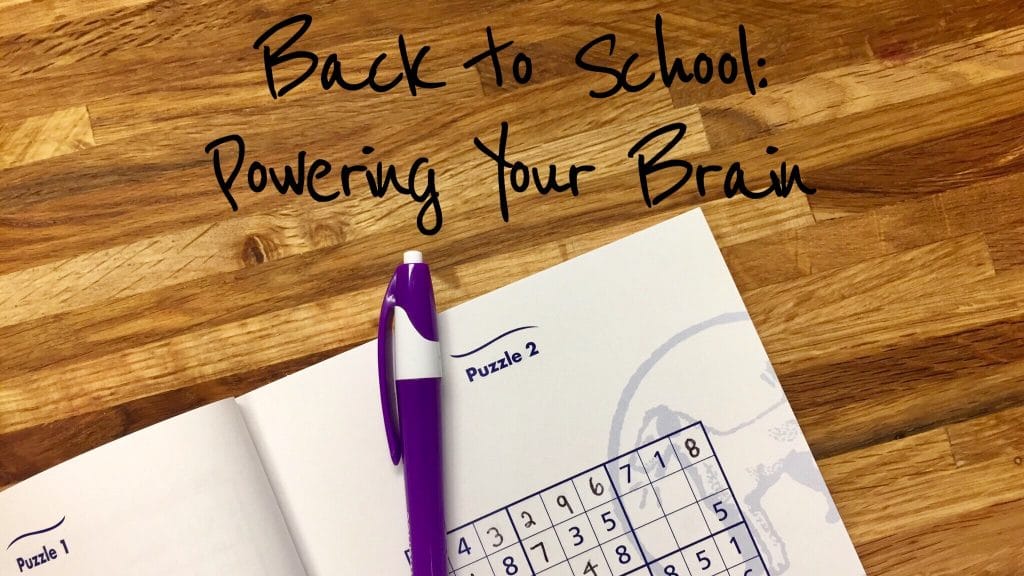School is in full swing, and amidst the busyness this season can sometimes bring, it is a good reminder of new beginnings and opportunities for positive change. Many of us have been affected by the new school year and have made adjustments to our routines: teachers and students returning to school, parents juggling work with their kids’ school and extracurricular activities and countless others making changes to simply navigate through school traffic during rush hour.
We’ve identified this as a time to take advantage of the new routines we’re already establishing to incorporate healthy behaviors. As such, we are back with the final installment of our mini-series on maintaining health and wellness during the back-to-school season. In our previous posts, Back to School: Remembering to Eat Well and Back to School: Getting ACTIVE, we covered ways to incorporate nutrition and physical activity in our daily routines. Now, we’re ending this series with practical ways we can care for our brains.
While you are refreshing your routine in response to the new school year, now is a great time to pay attention to your brain health. With a few minor adjustments, you can support your brain and feel a noticeable difference in your daily life.

Five tips for powering your brain:
- Maintain a balanced diet and get adequate exercise.
Did you know? Your brain is constantly working, and it gets fuel from the foods you eat. Eating foods rich in vitamins, minerals and antioxidants, while avoiding sugar and processed foods, will help your brain function optimally. In addition, exercise improves mood and sleep, reduces stress and boosts memory and learning functions. More on this here.
How to power up: Make an effort to eat for your brain. Incorporate brain-healthy foods such as berries, dark leafy greens, eggs, nuts and legumes into your daily diet. More on this here. To increase physical activity, try adding 30 minutes of active time into your daily routine.
- Stimulate your brain and memory.
Did you know? Just like muscular strength, our ability to remember increases when it is exercised and nurtured with healthy habits.
How to power up: Exercise your brain by trying new things! Try brushing your teeth with your non-dominant hand, learning a new hobby or engaging in brain games like word searches, crossword puzzles or Sudoku. More on this here.
- Set limits around screen time.
Did you know? Extended use of screens can contribute to vision problems, headaches and back and neck aches. In addition, some studies have shown that people who spend significant time around screens are more likely to experience attention disorders, which can affect learning. More on this here.
How to power up: Start by logging screen time versus active time. This will give you an idea of where to start. Reduce screen time by setting limits that work for your family and enforcing them. Consider making bedrooms screen-free zones and having mealtimes at the table instead of in front of a screen. More on this here.
- Get plenty of sleep.
Did you know? Sleep plays a vital role in brain functioning. While you sleep, your brain is still hard at work forming new pathways to help you learn and remember information. Adequate sleep goes a long way in helping you make decisions, solve problems, pay attention and learn new things. The generally recommended amount of sleep hours per day is at least 10 for school-aged children, 9-10 for teens and 7-8 for adults.
How to power up: To ensure you’re getting enough sleep to support your brain, try establishing consistent sleep and wake times, avoid using electronics during the hour before bed and avoid consuming alcohol and heavy meals before bed. More on this here.
- De-stress and prioritize positive thoughts.
Did you know? Your body’s stress response is activated when there is a perceived threat. Your brain sends signals to release adrenaline and cortisol. These increase your heart rate, blood sugar and blood pressure to help you escape from that perceived threat. Over time, significant amounts of stress can weaken your immune system, impair memory, raise your blood pressure and contribute to depression and anxiety. More on this here.
How to power up: Explore what works best for you in terms of stress-relieving activities. Meditation, physical activity and completing creative projects can all be positive outlets for managing stress. Also, being optimistic creates better coping skills during hardships and times of stress. Becoming intentional about positive thought patterns can make a huge difference in handling stress. More on this here.
Taking care of your brain can have endless physical, mental and emotional benefits. Check out this resource for even more ways you can support your brain.
As we close this mini-series, we hope you’re feeling informed and empowered to conquer the back-to-school season with a routine that includes eating well, getting active and powering your brain! Ready, set, go!
